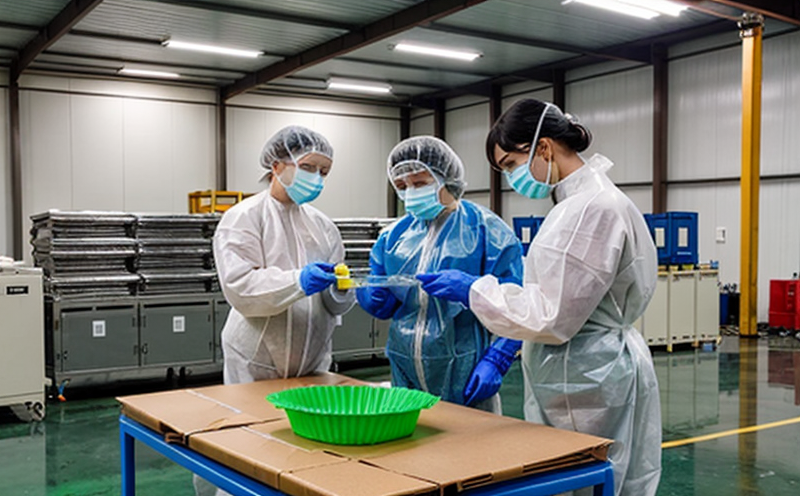ISO 6602-1 Thermomechanical Analysis of Plastic
The ISO 6602-1 standard provides a comprehensive guide for performing thermomechanical analysis (TMA) on plastic materials. This test method is essential for understanding the thermal and mechanical properties of plastics under various conditions, which are critical in ensuring the quality, durability, and safety of packaging. The primary purpose of this test is to evaluate how a plastic material behaves when subjected to temperature changes, providing insights into its dimensional stability, glass transition temperatures (Tg), melting points, and other important characteristics.
Thermomechanical analysis involves applying a controlled displacement to the sample while monitoring the resulting force. This process helps in determining the effects of heat on the material's dimensions and mechanical properties. The test can be conducted under different environmental conditions, such as dry air or humid atmospheres, depending on the specific requirements of the application.
Specimen preparation for this analysis is crucial. Samples should ideally be rectangular blocks with a uniform thickness to ensure accurate results. Care must be taken during sample preparation to avoid introducing any external stresses that could affect the test outcome. Once prepared, samples are placed into the TMA instrument, where they undergo controlled heating and stretching.
The data obtained from this analysis is invaluable for various industries, including packaging. For instance, it helps in optimizing the design of plastic containers by ensuring that they maintain their structural integrity under expected temperature variations. This information can also be used to enhance the recyclability of materials by identifying optimal processing temperatures. Additionally, TMA results play a pivotal role in compliance with regulatory standards and industry best practices.
The application of ISO 6602-1 is not limited to just packaging but extends across multiple sectors where plastic materials are used. In industries like automotive, medical device manufacturing, and electronics, understanding the thermal behavior of plastics ensures that products perform reliably under diverse operating conditions. The test method supports innovation in material science by providing precise data on how different chemical compositions affect a polymer's properties.
Understanding the nuances of TMA is essential for achieving accurate results. Factors such as heating rate, displacement speed, and atmospheric conditions can significantly influence the outcome. Proper calibration of the equipment and adherence to standard procedures are paramount in obtaining reliable measurements.
Applied Standards
| Standard Number | Description |
|---|---|
| ISO 6602-1:20XX | Thermomechanical analysis of plastics—Part 1: Method for measuring the linear thermal expansion coefficient and the glass transition temperature using a thermomechanical analyzer. |
Why Choose This Test
Choosing ISO 6602-1 Thermomechanical Analysis for plastic packaging offers several advantages. Firstly, it provides precise measurements of key thermal and mechanical properties that are crucial for ensuring product quality. Secondly, the test helps in optimizing material selection by identifying the most suitable plastics for specific applications based on their performance under various environmental conditions.
A significant advantage of this test is its ability to assess the dimensional stability of plastic packaging materials. This ensures that the containers maintain their shape and integrity over time, even when exposed to temperature fluctuations common during storage or transportation. Additionally, TMA can help in determining optimal processing temperatures for manufacturing processes, thereby reducing defects and waste.
The test also supports sustainability efforts by aiding in the development of more recyclable packaging solutions. By understanding how different plastic compositions behave thermally, manufacturers can design products that are easier to recycle without compromising on performance. Furthermore, TMA results contribute to meeting regulatory requirements for food contact materials, ensuring compliance with safety standards.
For R&D engineers and quality managers, this test method offers a powerful tool for innovation and process improvement. It allows them to stay ahead of industry trends by continuously refining their products based on the latest scientific findings. In summary, ISO 6602-1 Thermomechanical Analysis is an indispensable service for anyone involved in the design, development, or quality assurance of plastic packaging.
International Acceptance and Recognition
- The ISO 6602-1 standard has been widely adopted by industries around the world due to its reliability and accuracy.
- It is recognized by regulatory bodies in various countries, including those responsible for food safety regulations.
- Many leading packaging manufacturers use this test method as part of their quality control processes.
- The results are accepted in international trade agreements, ensuring that products meet global standards.
The widespread acceptance and recognition of ISO 6602-1 reflect its importance in the global plastics industry. By adhering to this standard, manufacturers can ensure consistent product quality across different regions, facilitating smoother international transactions and compliance with international regulations.





